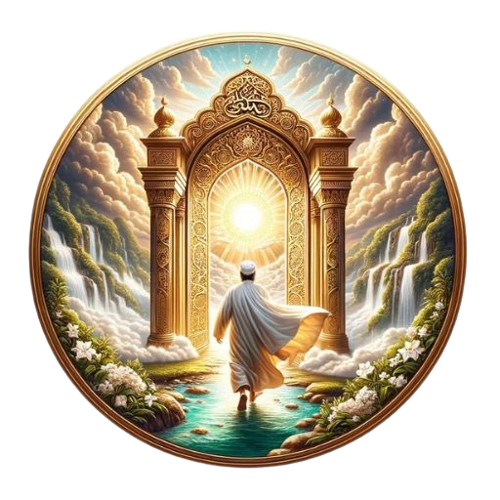In the Quran:
Prophet Nuh (Noah) is mentioned in multiple places in the Quran. He was one of the earliest messengers sent by Allah to guide people to monotheism. His story is a significant lesson on faith, perseverance, and patience.
Surah Hud (11:25-26):
Arabic:
وَلَقَدْ أَرْسَلْنَا نُوحًا إِلَىٰ قَوْمِهِ إِنِّي لَكُمْ نَذِيرٌ مُّبِينٌ (٢٥) أَن لَّا تَعْبُدُوا۟ إِلَّا ٱللَّهَ ۖ إِنِّىٓ أَخَافُ عَلَيْكُمْ عَذَابَ يَوْمٍ أَلِيمٍۢ (٢٦)
Transliteration:
Wa laqad arsalna Noohan ila qawmihi innee lakum natheerun mubeen (25) An la ta’budo illallah inni akhaafu ‘alaykum ‘adhaba yawmin aleem (26)
Translation:
“And We certainly sent Noah to his people, [saying], ‘Indeed, I am to you a clear warner (25) That you not worship except Allah. Indeed, I fear for you the punishment of a painful day.’ (26)”
Surah Al-Qamar (54:9-10):
Arabic:
كَذَّبَتْ قَبْلَهُمْ قَوْمُ نُوحٍۢ فَكَذَّبُوا۟ عَبْدَنَا وَقَالُوا۟ مَجْنُونٌۭ وَٱزْدُجِرَ (٩) فَدَعَا رَبَّهُۥٓ أَنِّى مَغْلُوبٌۭ فَٱنتَصِرْ (١٠)
Transliteration:
Kadh-dhabbat qablahum qawmu Noohin fakadh-dhaboo ‘abdanaa wa qaaloo majnoonuw wazdujir (9) Fada’a rabbahoo annee maghloobun fantasir (10)
Translation:
“The people of Noah denied before them, and they denied Our servant and said, ‘A madman,’ and he was repelled. (9) So he invoked his Lord, ‘Indeed, I am overpowered, so help.’ (10)”
Surah Nuh (71:1-4):
Arabic:
إِنَّآ أَرْسَلْنَا نُوحًا إِلَىٰ قَوْمِهِۦٓ أَنْ أَنذِرْ قَوْمَكَ مِن قَبْلِ أَن يَأْتِيَهُمْ عَذَابٌ أَلِيمٌۭ (١) قَالَ يَٰقَوْمِ إِنِّى لَكُمْ نَذِيرٌۭ مُّبِينٌ (٢) أَنِ ٱعْبُدُوا۟ ٱللَّهَ وَٱتَّقُوهُ وَأَطِيعُونِ (٣) يَغْفِرْ لَكُم مِّن ذُنُوبِكُمْ وَيُؤَخِّرْكُمْ إِلَىٰٓ أَجَلٍۢ مُّسَمًّى ۖ إِنَّ أَجَلَ ٱللَّهِ إِذَا جَآءَ لَا يُؤَخَّرُ ۖ لَوْ كُنتُمْ تَعْلَمُونَ (٤)
Transliteration:
Inna arsalna Noohan ila qawmihi an anzir qawmaka min qabli an ya’tiyahum ‘adhabun aleem (1) Qaala yaa qawmi innee lakum natheerun mubeen (2) Ani’budullaaha wattaqoohu wa atee’oon (3) Yaghfir lakum min dhunoobikum wa yu’akhkhirkum ila ajalin musamman inna ajala Allahi idha jaa’a laa yu’akhkhar law kuntum ta’lamoon (4)
Translation:
“Indeed, We sent Noah to his people, [saying], ‘Warn your people before there comes to them a painful punishment.’ (1) He said, ‘O my people, indeed I am to you a clear warner, (2) [Saying], “Worship Allah, fear Him, and obey me. (3) He will forgive you of your sins and delay you for a specified term. Indeed, the time [set by] Allah, when it comes, will not be delayed, if you only knew.”‘ (4)”
These verses highlight Nuh’s mission to call his people to worship Allah and abandon idolatry, as well as the subsequent rejection and ridicule he faced.
In Hadith:
Prophet Nuh is also mentioned in the hadith, particularly in discussions regarding the Prophets and the Day of Judgment.
Sahih al-Bukhari (Hadith 3348):
Narrated Abu Huraira:
The Prophet (ﷺ) said, “On the Day of Resurrection the people will assemble, and they will say, ‘If only we could request someone to intercede for us with our Lord!’ Then they will go to Adam and say, ‘You are the father of mankind; Allah created you with His Own Hand and made His angels prostrate before you, and taught you the names of all things; so please intercede for us with your Lord, so that He may relieve us from this place of ours.’ Adam will say, ‘I am not fit for that.’ Then Adam will remember his sin and feel ashamed thereof. He will say, ‘Go to Noah, for he was the first Apostle whom Allah sent to the people of the Earth.’ So they will go to him, but he will say, ‘I am not fit for that.’ He will remember his appeal to his Lord to do something of which he had no knowledge (i.e., his asking Allah to save his disobedient son). He will feel ashamed thereof and will say, ‘Go to Abraham, Khalil Ar-Rahman.’“
This hadith reflects Nuh’s (Noah) high status as the first of Allah’s messengers to the people of the Earth and his humility in admitting his limitations.
Sahih Muslim (Hadith 194):
Narrated by Abu Huraira:
“The Prophet (ﷺ) said, ‘When the Day of Judgment will approach, the Prophet Nuh will be called and asked, ‘Did you convey the Message of Allah?’ He will reply, ‘Yes.’ Then his people will be asked, ‘Did he convey the Message to you?’ They will reply, ‘No warner came to us.’ Then it will be said to Nuh, ‘Who will bear witness in your favor?’ He will reply, ‘Muhammad and his followers.’ So they (i.e., Muslims) will testify that he conveyed the Message.’“

The Story of Prophet Nuh (Noah) (Peace Be Upon Him)
Prophet Nuh (PBUH) is one of the earliest prophets sent by Allah to guide humanity to the right path. His story is mentioned in various places in the Quran and Hadith, serving as a reminder of the consequences of disobedience and the rewards of patience, faith, and perseverance. Below is a detailed account of the life of Prophet Nuh (PBUH) based on the Quran and Hadith.
Prophet Nuh (PBUH) & His People
Prophet Nuh (PBUH) was sent to his people when they had strayed far from the path of righteousness. They had begun to worship idols and engaged in all kinds of sinful behavior, neglecting the worship of Allah. Nuh (PBUH) was chosen by Allah as a warner to his people, to call them back to monotheism and to worship only Allah.
Allah describes this mission in Surah Hud (11:25-26):
“And We certainly sent Noah to his people, [saying], ‘Indeed, I am to you a clear warner. That you not worship except Allah. Indeed, I fear for you the punishment of a painful day.’ “
For 950 years, Prophet Nuh (PBUH) dedicated himself to this mission, patiently calling his people to abandon their idolatry and turn to Allah. He used every method possible: speaking publicly, and privately, reasoning with them, and warning them of the severe punishment of Allah. His plea was straightforward—worship only Allah, fear Him and follow the guidance given by His prophets.
The Rejection of Prophet Nuh (PBUH) Message
Despite his unwavering efforts, the people of Nuh were largely obstinate and arrogant. They ridiculed him, accusing him of being a madman, as mentioned in Surah Al-Qamar (54:9):
“The people of Noah denied before them, and they denied Our servant and said, ‘A madman,’ and he was repelled.”
Only a few people believed in Nuh’s message, mostly those who were poor and marginalized. The leaders and wealthy elites were the ones who mocked him the most, arguing that if Allah truly intended to guide them, He would have sent a more prestigious man, not someone like Nuh. They continued to live sinful lives, worship idols and ignored Nuh’s warnings of an impending disaster.
Prophet Nuh’s people often argued: “Shall we follow you, when the meanest (of the people) follow you?” They saw the faith of the weak and poor in Nuh’s message as a reason to reject him further.
Prophet Nuh (PBUH) Supplication to Allah
After centuries of rejection and mockery, Nuh (PBUH) turned to Allah and made a heartfelt plea. He asked for Allah’s help, as he was overpowered and could no longer bear the rejection of his people. This is beautifully expressed in Surah Al-Qamar (54:10):
“So he invoked his Lord, ‘Indeed, I am overpowered, so help.’ “
Allah responded to his call. In Surah Nuh (71:26-27), Nuh made a final supplication asking Allah to bring down His punishment upon the disbelievers:
“And Noah said, ‘My Lord, do not leave upon the earth from among the disbelievers an inhabitant. Indeed, if You leave them, they will mislead Your servants and not beget except wicked disbelievers.’ “
The Construction of the Great Ark
In response to Nuh’s supplication, Allah commanded him to build a large ark (ship) in preparation for a great flood that would wipe out the disbelievers. This command was unusual and caused further mockery from his people, as they lived far from any body of water.
Allah said in Surah Hud (11:37-38):
“And construct the ship under Our observation and Our inspiration and do not address Me concerning those who have wronged; indeed, they are [to be] drowned.”
Nuh followed Allah’s instructions carefully. As he and his followers built the ark, the disbelievers laughed at him, saying, “Where is the water?” But Nuh remained firm in his faith and continued the task assigned to him by Allah.

The Great Flood
Once the ark was completed, Allah instructed Nuh to gather his family, the believers, and pairs of animals into the ark. The Quran narrates that once they were safely aboard, Allah’s command was fulfilled. Torrential rain began to fall from the sky, and water gushed from the earth. The flood that followed was unlike anything humanity had ever witnessed.
In Surah Al-Qamar (54:11-13), Allah describes the event:
“So We opened the gates of the heaven with pouring rain (11) And caused the earth to burst with springs, and the waters met for a matter already predestined. (12) And We carried him on a [construction of] planks and nails.”
The floodwaters covered everything, and the disbelievers were drowned. Among the drowned was one of Nuh’s own sons, who had rejected his father’s call to board the ark, preferring instead to climb a mountain, thinking he could escape the flood.
Nuh, heartbroken, asked Allah to save his son. However, Allah reminded Nuh that his son was not among the righteous, as he had rejected the truth.
In Surah Hud (11:45-46), Allah says:
“And Noah called to his Lord and said, ‘My Lord, indeed my son is of my family; and indeed, Your promise is true; and You are the most just of judges!’ He said, ‘O Noah, indeed he is not of your family; indeed, he is [one whose] work was other than righteous, so ask Me not for that about which you have no knowledge. Indeed, I advise you, lest you be among the ignorant.’ “
A New Beginning
After the flood, the water receded, and the ark came to rest on Mount Judi. Allah then commanded the earth to swallow its water and the skies to withhold the rain. The flood subsided, and the believers, led by Prophet Nuh, disembarked from the ark to begin life anew.
In Surah Hud (11:48), Allah tells Nuh:
“It was said, ‘O Noah, disembark in security from Us and blessings upon you and upon nations [descending] from those with you. But other nations of them We will grant enjoyment; then there will touch them from Us a painful punishment.’‘
Also, read the Story of Prophet Idris (Enoch) (Pbuh)

